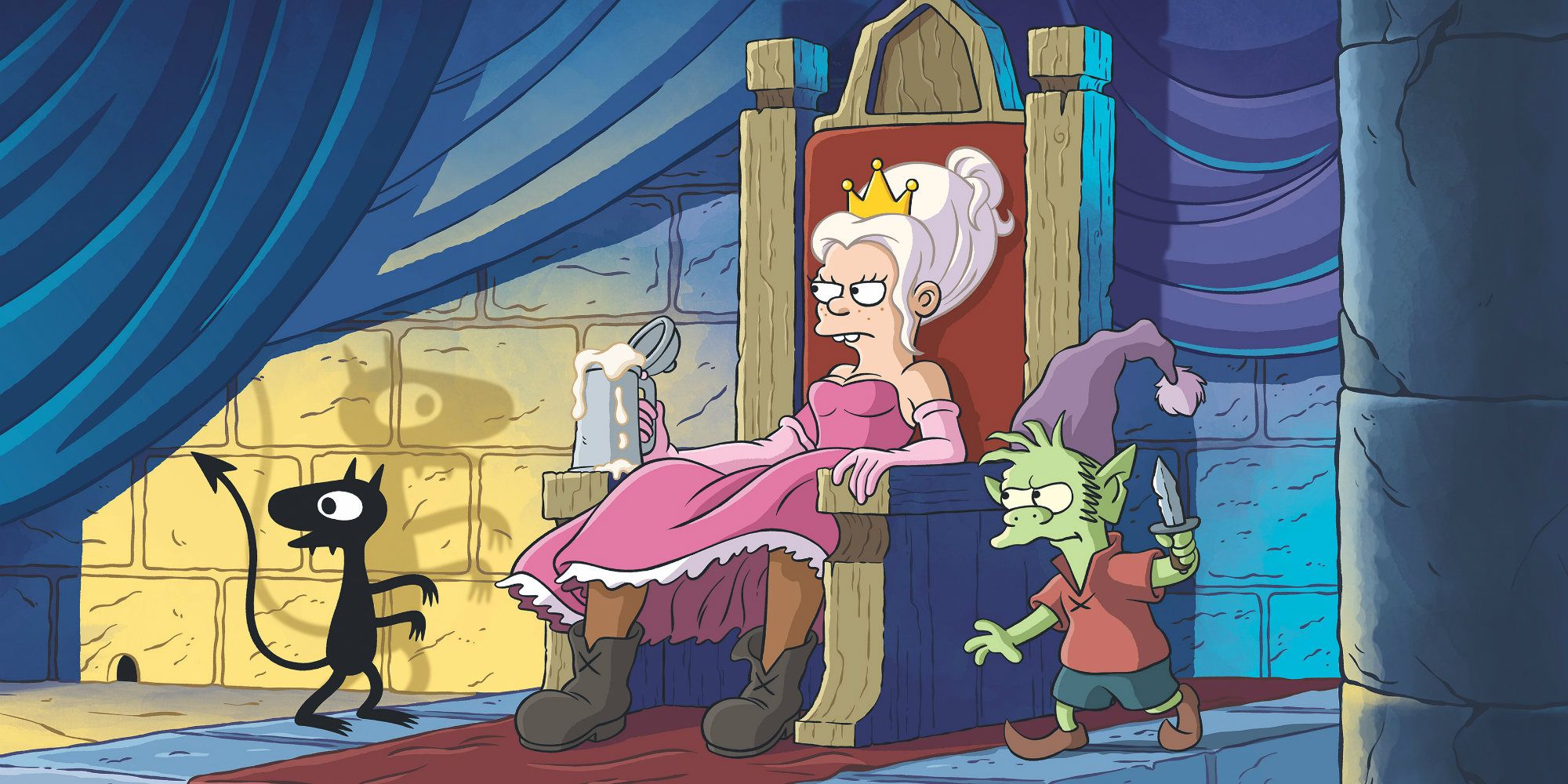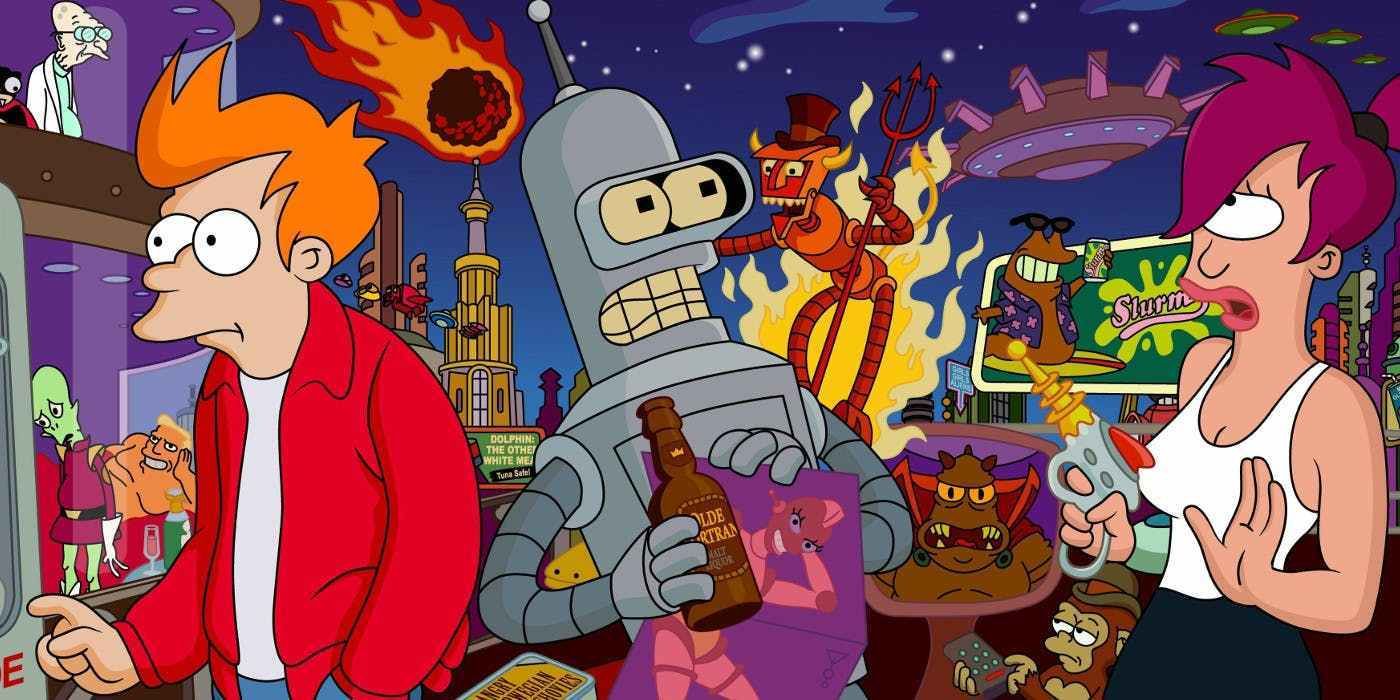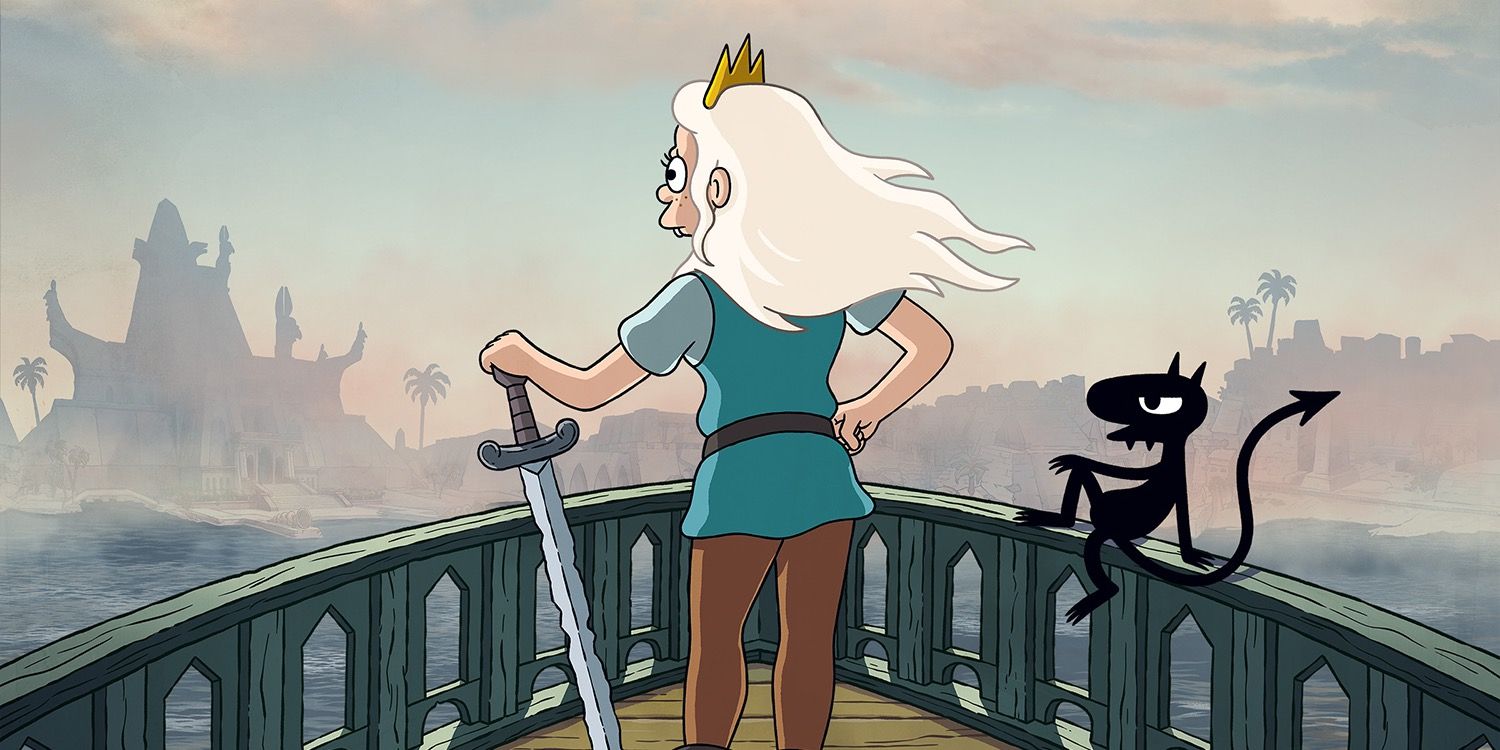Disenchantment season 2 has the potential to be as great as Futurama if its showrunners learn from the mistakes of its first season. Matt Groening’s first series in the era of bingeable media may have faltered in its first steps, but it is far from unsalvageable.
Disenchantment takes place in the magical kingdom of Dreamland, with the action centered upon Princess Bean – a strong-willed young woman who wanted more out of life than being married off to some random inbred prince so that her father, King Zog, could secure a political alliance. Bean came to be accompanied by two similar misfits; Elfo, who had been cast out of the Elfwood for not being jolly enough, and Luci, a personal demon charged with the task of corrupting Princess Bean. This proved to be an easy job for Luci, as Bean was already sneaking out of the palace, carousing and generally acting in a manner unbecoming a princess on a regular basis.
While it may be unfair to compare Disenchantment to Groening’s earlier works as they were created for different eras of television, such comparisons were also inevitable. Nevertheless, The Simpsons and Futurama were similarly rough and unproven after their first seasons and would not develop into the cultural institutions they are now until after several years. With Disenchantment already renewed through season 3, there is ample reason to hope that it may yet develop into a worthy part of Groening’s legacy.
Why Disenchantment Wasn’t An Instant Hit

The early advertising for Disenchantment made it look like a fantasy-based counterpart to the sci-fi themed Futurama. As such, it was natural for fans to draw comparisons between the main characters of Futurama and the power trio of Bean, Elfo and Luci. Leela and Bean were both warriors at heart, stifled by sexism, who wanted to regain the parents they had lost at a young age. Elfo and Fry were both naive man-children lost in a new world, who came to develop crushes on the one woman who showed them kindness. Luci and Bender were both inhuman creatures who longed to destroy humanity, yet couldn’t help becoming attached to individual humans.
Fans of Groening’s work were stunned when Disenchantment proved to be less of an episodic comedy and more of a fantasy epic with comedic elements that was broken into 22-minute chapters. This was by design, as the series was meant to be binged, rather than enjoyed one week at a time. The problem with Disenchantment was that it played it too safe in clinging to familiar stock characters early on and tried to rush their development into unique individuals, while throwing out jokes about its fantasy setting. This proved necessary, given Netflix’s short season order.
Unfortunately, this ultimately left no time to develop Disenchantment’s core characters to the same degree as Futurama. The first season had a 2-part series pilot and its final 3 episodes were devoted to resolving most of the season’s subplots regarding the Elixir of Life, King Zog’s true reasons for seeking it and establishing the new status quo for season 2. This meant Disenchantment had just a scant 5 episodes to explore the setting, develop the relationships between its leads, introduce the show’s supporting cast and generally build its world.
How Futurama Developed Its Characters

By comparison, Futurama had a leisurely length of time to build its world and develop its cast. Most of the first two seasons were devoted to comedic parodies of classic science-fiction concepts, which informed the supporting characters. For instance, Futurama‘s Zapp Brannigan was a sleazy, less competent version of Star Trek‘s Captain James T. Kirk and the mating habits of Vulcans revealed in “Amok Time” were parodied in “Why Must I Be A Crustacean In Love?” – the Futurama season 2 episode in which Dr. Zoidberg returned to his home planet to seek a lover.
Most of the cast didn’t truly begin to take shape beyond their stock personalities until the end of Futurama season 2. It was here that Bender began to be defined by his criminal activities and iconoclastic personality rather than simply being a robot. It was not until Futurama season 3 and the episode “Parasites Lost” that the show began to play around with the existing relationships between the characters and the on-again/off-again romance between Fry and Leela began to develop. Similarly, Leela’s origins and the revelation that she was a mutant rather than an alien were not explored until season 4.
Disenchantment season 1 was prevented from doing this by a shorter order and a need to cut to the chase because of the demands placed on series produced for streaming services like Netflix. There was no time for the characters to be effectively expanded beyond a few stock traits in the same manner as Futurama. Unfortunately, the show stumbled in trying to have it both ways, developing its characters at a hurried pace without allowing time for the changes to come about in a natural fashion.
Elfo is perhaps the best example of how character development suffered because of Disenchantment‘s quickened pace. Most of Disenchantment‘s episodes defined Elfo by his innocence and his earnest desire to be helpful, even to people with obvious ill intent. This never really matched Elfo’s behavior in the pilot, where he was exiled for his cynicism regarding elvish society and questioning the Jolly Code. The romance between Bean and Elfo was similarly haphazard, with barely two episodes passing between Elfo’s confession of his feelings for Bean and his death. Similarly, the conflict in the penultimate episode in which Bean was offered the choice of resurrecting her mother or Elfo seeming remarkably one-sided, as Bean never truly had time to process her own feelings for Elfo before the end of Disenchantment season 1.
How Disenchantment Season 2 Can Course-Correct

It’s too late for Disenchantment season 2 to receive an order of 13 episodes or more, which is a shame as allowing the series more time to unfold would be the most sure-fire way for it to capture the old magic of Futurama. Unfortunately, given that the series’ story is already mapped out and its key plotline already underway, that probably isn’t possible even beyond season 2.
The best way for Disenchantment to equal Futurama and move forward is for it to stay true to its original vision and focus on its characters and its story, deriving its humor from these elements rather than depending on cheap referential gags to old fairy tales and fantasy shows. While it would have been better for Bean, Elfo and Luci to have been developed into distinctly different characters than Leela, Fry and Bender before the quest to save Dreamland began, it can still happen provided the show sticks to its guns and follows Futurama in how it developed its characters by working past the classic tropes. If this should happen, Disenchantment may come to be as fondly regarded as Futurama.




